History of Urban Frontiers Mission
In 1989 a group of friends started meeting every Friday for Bible study in Jos, Nigeria at the apartment of Leslie Pelt who was an SIM missionary. The original members of the group included Musa Panya Baba, Sonnie Reng, Lucy Samuel, Chinyere Umunnakwe, Sam Samani, Vicky Yusuf and Leslie Pelt and over the next year the group grew to about 15 to 20 members.
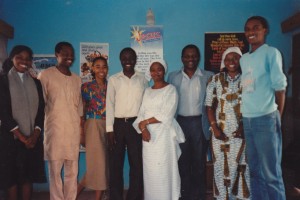
For a few months they studied the Sermon on the Mount and each week they gained new insights on what it means to walk in the steps of Jesus Christ. One Friday night at the conclusion of the study, Lucy Samuel said that if they were really walking in the steps of Christ, they would be reaching out to people in desperate need like Jesus did. Lucy’s words sent the group into prayer asking God to show them what He wanted them to do. That same night, an SIM missionary named Marian had a heart attack and was taken to Evangel Hospital. On Sunday morning of weekend, Ruth Cox, another SIM missionary went to visit her and walked from Challenge Compound to Evangel Hospital because her car would not start. On that two mile walk, Ruth, for the first time noticed the brothels located on the little side streets and groups of young people involved in things that did not honour God. Ruth was very burdened and when she got home, she asked Leslie to take a walk with her.. As they walked Ruth said, “Someone needs to reach these young people. Look what is happening on the streets while all the Christians are in church.” Leslie realized that this could be what God was calling their Bible study group to do. She told Ruth what Lucy said after their study on Friday and how convicted they all were.
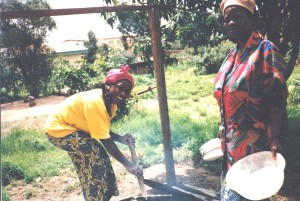
On Monday, some of the members of the Bible study group were at Leslie’s apartment and she shared with them what she and Ruth had discussed and seen. Immediately, Lucy and another person in the study named Steven said that God had given them that concern for the brothels, but they didn’t know what to do about it. The rest of the group agreed that they believed this is what God was calling them to do in response to His commands to walk in the steps of Jesus.
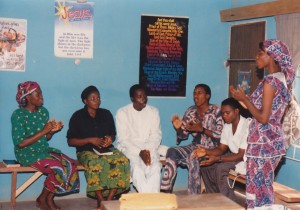
The team started going to the brothels in their free time and talking to whoever would listen about Jesus’ love and forgiveness. Almost immediately young men and women were asking Christ to forgive them take control of their lives. The Bible study group found themselves trying to provide a spiritual foundation for new believers who needed to overcome abuse, addictions, demonic strongholds, economic poverty, illiteracy, STDs, lack of job skills, debt and much more. The group prayed each step of the way for wisdom, direction, provision and growth for these new followers of Christ.
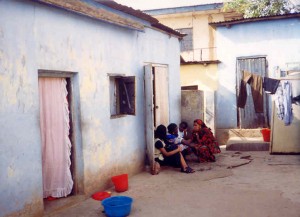
By 1990 new believers started moving into the homes of Lucy Samuel, Sonnie Reng and Leslie Pelt. Some of the Bible study members who had jobs would bring financial support to help with food and medical needs. An EMS missionary named Faharia Mazah helped the team survey the city of Jos and identify the brothels, drug dens, gambling spots, crime areas where homeless youth gathered and other areas of urban need. The team gave themselves the name Evangelical Survey Team. Sonnie Reng sensed God calling him to do this work full time and the Bible study group chose him to be the leader of the ministry. They appointed an advisory committee of interested mature believers in Jos that included Gbade Ogundare, Dr. Clara Iya and about three others who gave the team counsel and encouragement. The ministry continued to grow far beyond surveying the city and into daily evangelism outreach, literacy lessons, discipleship and vocational training. With this growth they changed their name to Evangelical Services Team (EST).
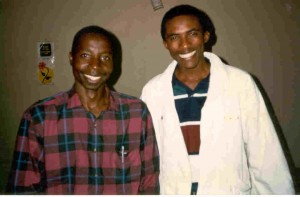
Soon others who had a burden for the harassed and helpless in the urban areas learned about EST, joined the ministry and helped the ministry develop in significant ways. This included Bayo Oyebade and Nike Ishola. A few years later, they changed the name again to Urban Frontiers Mission, registered with the government and appointed a Board of Directors, chaired by Rev. Victor Musa.
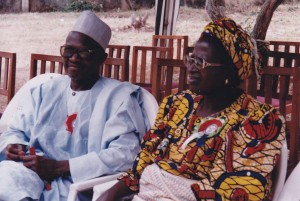
Office and Discipleship and Rehabilitation Homes
In 1991 the group rented an office at 41 Tafawa Balewa Street which also served as housing for Sonnie Reng and some of the male staff members and male disciples. It was also the place where the team met daily for prayer, to plan outreach and to bring interested contacts for prayer, counseling, Bible study, meals and fellowship. The apartment of Leslie Pelt also filled up with UFM female staff and disciples. Through Nike Ishola, who was a member of ECWA Plateau Church, the church caught the vision for this ministry and in 1993 rented a house to be used for discipleship and rehabilitation. The women shifted to that house and Nike became the Ladies’ Discipleship House leader. Also in 1993 a men’s house was acquired and Sonnie served as the Men’s Discipleship House leader in addition to serving as UFM President. In 1995 the ministry left those two houses and rented a house at 6 Wamba Road, primarily for women and children. In 2001 UFM purchased a house at 12 Dandaura Road which was initially used for the men and later for at-risk youth. Later the ministry rented a house at Apollo Close for staff housing, short term missionary accommodation and housing the growing number of vulnerable children that God was brining to the ministry. Also in 2001, UFM purchased a property at Kuru Jenta 3 for discipleship and rehabilitation. With this purchase, they moved the discipleship and rehabilitation focus of the ministry to this location outside of the city. With two property purchases, the ministry decided to give up all of the rented properties.
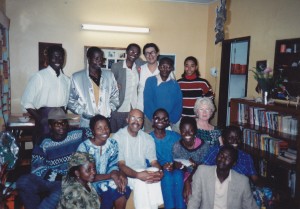
Leadership
Sonnie Reng was unanimously chosen as ministry leader from inception. Generally, a management team of about four has served with him overseeing Outreach, Training & Rehabilitation, Finance and Administration & Personnel. These leaders included: Nike Ishola, Bayo Oyebade and Leslie Pelt in the early years. Others who came in later included: Yar Gorgboyee, Lucy Samuel, John Jirgba, David Abidan, Johnson Ogbe, Kefas Samuel, John Adang, Joseph Kamida, Obadiah Samuel, Deborah Horo, Rose Nyong and Eddie Nyong.
Ministry locations and focus
In the early years, the ministry focus was on Jos with daily evangelism outreach in the urban center and discipleship and vocational training in the discipleship and rehabilitation homes. Eventually there were many “Macedonian Calls” to new locations like Lagos, Abuja, Maikurdi, Gboko, Kano and Gombe. In some cases, UFM established ministry in the new locations, however, in most cases, UFM sent staff to train local churches to start their own urban ministry. UFM did extensive training in Kano with ECWA Kano English Section and would send staff to live and work there to work alongside them in outreach and in their discipleship home. UFM sent staff to House of Grace in Lagos on a regular basis as they got their urban ministry started.
At a point, UFM divided the ministry into Zones with the vision for every zone to run in collaboration with the headquarters. The Northeastern Zone covered Borno, Bauchi and Gombe with headquarters in Gombe. Joseph Kamida was chosen to be the leader of that Zone. The Middle Belt Zone was also established, covering Plateau, Benue, Abuja and Adamawa. This Zone includes ministry locations in Jos, Kuru and Gboko. Elder Daniel Haruna was chosen to be leader of the Gboko outreach area and recruited many faithful local church members to assist there. The Southwestern and Southeastern Zones were also created but no staff members were assigned to serve in those areas. However, staff members were sent to the Southwestern zone to work with House of Grace in Lagos.
The primary focus in the Northeastern Zone has been evangelism outreach and engaging and training the churches in urban ministry. The primary focus of Kuru is discipleship, rehabilitation and vocational training.
US Office
In 2002 Sonnie Reng and Johnson Audu travelled to the US to help Leslie Pelt (now Engelsen) establish the US office. The purpose of this office is to raise resources for UFM and manpower to serve with the ministry on short or long term assignments.
Core Values
As the UFM listened to God’s voice and responded by trying to walk in the steps of Jesus, they wrote these Core Values The UFM Core Values guide, motivate and encourage the staff to persevere in this ministry.
- We believe that all human beings are created in the image of God and need salvation regardless of their spiritual, mental or social condition, realizing that Jesus did not come to call the righteous , but sinners and He was anointed by God to reach the poor, the oppressed, and those in bondage (Genesis 1:27, Romans 10:13, Matthew 9:12-13, Isaiah 61:1-2).
- We believe that God has called us to be people of compassion, as Jesus was when he saw the harassed and helpless multitudes and compared them to sheep without a shepherd (Matthew 9:36).
- We believe that as Christians we should be willing to forsake personal comforts and give sacrificially to those with material and physical needs such as food, clothing, shelter, vocational skills and medical care, realizing that faith without works is dead (James 2:14-17, Luke 9:58).
- We believe that only the gospel of Jesus Christ can transform spiritually broken lives and as Christians we are servants of God entrusted with the responsibility to proclaim this message in order to rescue people from the kingdom of darkness (1 Corinthians 4:1, Jde 23).
- We believe that once a life is transformed by Christ and reconciled to God, a person can overcome any kind of entangling sins or social disadvantages and live a productive life in the society , thus also being reconciled with men(1 John 5:4-5).
- We believe that those who have been rescued from the devil’s kingdom can be strategic instrument in God’s hand to evangelize and disciple others (2 Timothy 2:2, Mark 5:19).
Leave a Comment
You must be logged in to post a comment.